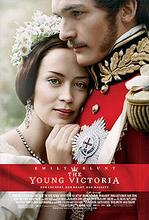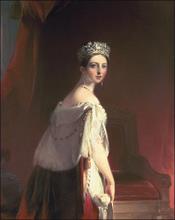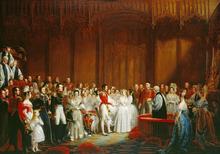The third in a series, this article provides a preview of a current movie along with a vocabulary lesson for intermediate to advanced English learners. The selected vocabulary words are in bold and followed by succinct definitions. Previous articles: Invictus and Sherlock Holmes .
 Victoria, crowned queen at the age of 18 in 1837 and living into the 20th century, was the longest-reigning British monarch. The Young Victoria, the 2009 film from the Québec director Jean-Marc Vallée, casts a sympathetic light on the teenaged Victoria as she comes of age (passes from child to young adult) amid power struggles (conflicts), court intrigues (secret schemes or love affairs), and family feuds (bitter, long-lasting quarrels).
Victoria, crowned queen at the age of 18 in 1837 and living into the 20th century, was the longest-reigning British monarch. The Young Victoria, the 2009 film from the Québec director Jean-Marc Vallée, casts a sympathetic light on the teenaged Victoria as she comes of age (passes from child to young adult) amid power struggles (conflicts), court intrigues (secret schemes or love affairs), and family feuds (bitter, long-lasting quarrels).
At the heart of the story is the romance between Victoria (played by Emily Blunt) and her German cousin Prince Albert (played by Rupert Friend), whom she married in 1840. Chafing (irritated, angered) under the oppressive control of her mother – the Duchess of Kent – and the Duchess’s political cohort and possible lover Sir John Conroy, Victoria takes great solace (comfort in sorrow or trouble) in the gentle kindness and unpretentious (modest, opposite of arrogant) manner of her suitor Albert.
In a scene that illustrates both the pressures she is under and the antidote (something that counteracts injurious effects, such as a remedy for a poison) offered by Albert, the two young people hold a hushed (very quiet, whispering) conversation while playing a game of chess under the watchful eyes of her family and their allies. Read the exchange below and then watch the chess game scene from The Young Victoria.
Victoria: Do you ever feel like a chess piece yourself, in a game being played against your will?
Albert: Do you?
Victoria: Constantly. I see them leaning in and moving me around the board.
Albert: The Duchess and Sir John?
 Victoria: Not just them. Uncle Leopold, the King, politicians ready to seize hold of my skirts and drag me from square to square.
Victoria: Not just them. Uncle Leopold, the King, politicians ready to seize hold of my skirts and drag me from square to square.
Albert: Then you had better master the rules of the game until you play it better than they can.
Victoria: You don’t recommend I find a husband to play it for me?
Albert: I should find one to play it with you, not for you.
In an interview, Emily Blunt, the young English actress who plays Victoria, describes the personalities of Victoria and Albert as polar opposites (complete opposites, like the North and South Poles) who balanced each other out. (Blunt uses a very British idiom to convey the same idea of a pair of opposites: “like chalk and cheese.”) Stubborn (obstinate) and feisty (full of animation, energy, or courage; spirited), often mistaking stubbornness for strength, attacking before thinking about it – these are the personality traits Blunt attributes to Victoria, characteristics she says were tempered (moderated, softened) by the logical, serious, calm demeanor (conduct, manner, also expression) of Albert, who in turn benefited from the laughter and joy that the more flamboyant (bold, dashing, showy) Victoria brought to the match.
Questions for discussion – leave a comment on this page!:
Can you think of another film in which a game of chess – or any other game or sport – plays a symbolic role?
 In a film based on real historical figures and events, how faithful to the facts should the filmmakers be? (One fictional embellishment in this film, for example, is that Albert is grazed (touched lightly in passing) by a bullet as he attempts to save Victoria from an assassin. In fact, Victoria escaped assassins more than once, but Albert was never wounded.)
In a film based on real historical figures and events, how faithful to the facts should the filmmakers be? (One fictional embellishment in this film, for example, is that Albert is grazed (touched lightly in passing) by a bullet as he attempts to save Victoria from an assassin. In fact, Victoria escaped assassins more than once, but Albert was never wounded.)
Which in your opinion is a more interesting film: (1) The Young Victoria; or (2) Mrs. Brown, the 1997 film starring Judi Dench and Billy Connolly that tells the story of Queen Victoria’s close friendship and possible romance with her Scottish servant John Brown long after the death of Prince Albert?





Leave a Reply